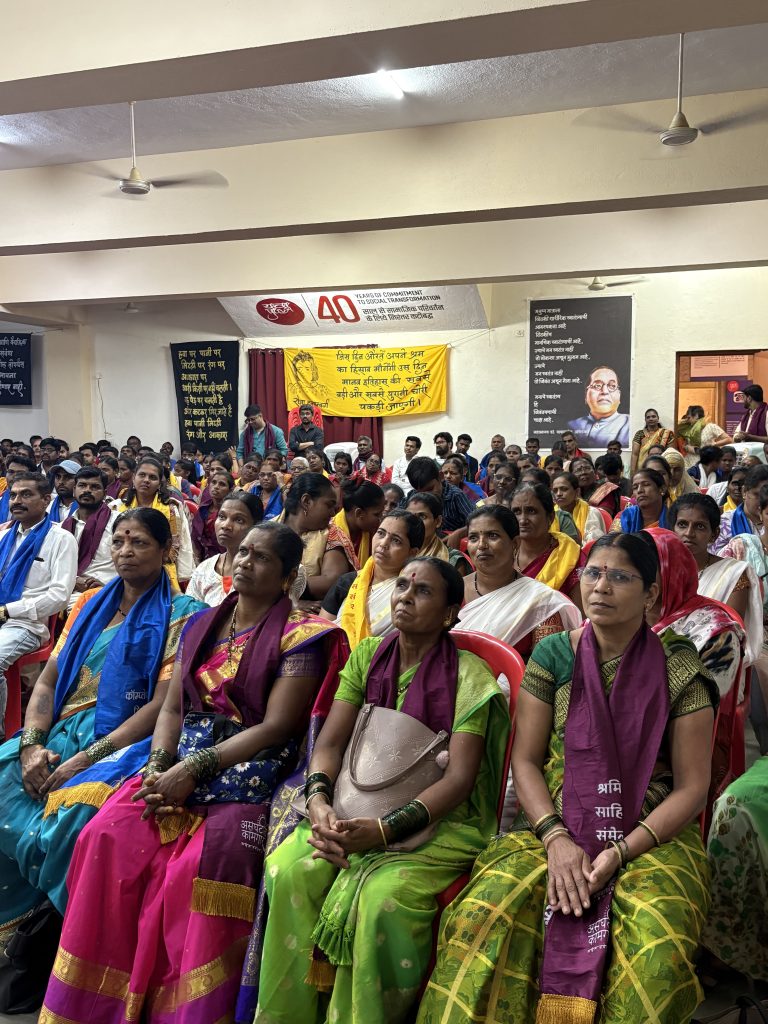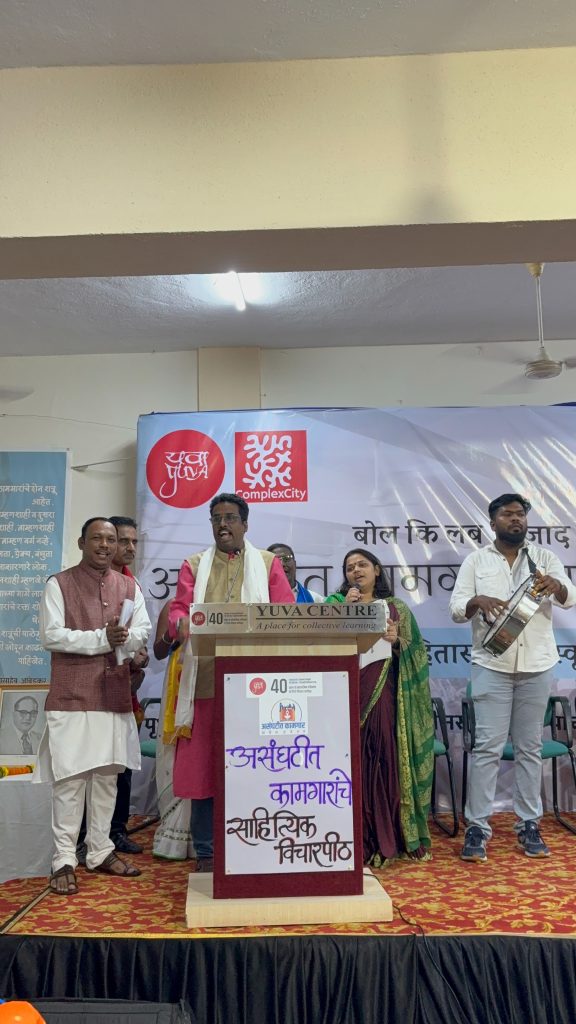There was a verve and energy at the YUVA Centre in Kharghar on 30 April 2025, as workers from across Mumbai came together to express themselves as artists, poets, and performers at the Shramik Sahitya Sammelan, a celebration of literature and art emerging from informal labour communities. Organised by YUVA, the event became a powerful space for workers to affirm their identity, share their creativity, and build solidarity through cultural expression.

The Sammelan was an extension of YUVA’s initiative ComplexCity, which over the past seven editions has created space for young people from marginalised urban communities to express themselves and contribute to inclusive city-building. The Sahitya Sammelan was focused on the diverse cultural forms shaped by unorganised workers and how they contribute to social and mental well-being.
Across generations, unorganised workers have contributed to our society. Whether it’s painting walls, construction work, or domestic work, they have found ways to tell their stories, through charolya, nakalas, bharuds, povada, and poetry.
The Shramik Sahitya Sammelan 2025 celebrated this cultural wealth. It was a gathering of voices, from construction workers to folk performers, reclaiming space and visibility through their art.
Here’s a quick video capturing the moments from the Sammelan:

The programme began with the singing of the Maharashtra State Song (to celebrate 1st May Maharashtra Day) and a motivational song by YUVA’s team. It was formally inaugurated by a collective reading of the Preamble of the Constitution. Roshni Nuggehalli, Executive Director of YUVA, in her opening remarks, highlighted that the objective of the festival is to sensitise marginalised workers and youth living in informal settlements and the importance of literature and culture and to offer them a space to continue creating literature in new ways. This would enable them to become their own voice, to stand independently, and to tell their own stories.
Raju Vanjare, programme coordinator at YUVA, shared that this is a space created by informal workers through their voices, art, and life experiences, a space where people could share their own stories, take pride in who they are, and express themselves.
Speakers Reflections:
- J.V. Pawar, Novelist, and Leader.: “In a world where informal workers, especially those in rural areas, face deep injustice and their struggles remain unseen, remember this: you are not less. You can do anything. Informal workers hold the power to transform society through their Work and arts.”
- Minar Pimple, Founder, YUVA: “Shika, Sanghatit Vha ani Sangharsha Kara, Dr Ambedkar’s message is clear. ‘Shika’ means to read, write, speak, reflect, and bring about change. By next year, may the sentences you write be displayed here on banners, echoing your truth.”
- Durgesh Sonar, Sr. Journalist, Sakal Media Group : “Literature does not emerge without rising from within. Our struggle is from the gut, it must be reflected in our writing. Our dialogue often stays with us, but it needs to reach society. As Narayan Surve said, the sweat of hard work is life’s essence; every drop is a seed for tomorrow’s revolution.”
Dhananjay Wayadande, Singer, Social worker : “The Sammelan gave voice and recognition to workers’ literature. We are on the side of humanity, continuing the traditions of Charvaka and Buddha.”
Performances by the Participants:
The second half of the day saw wonderful performances that brought these themes to life. The Ramai Group opened with a performance exploring mental health and community, followed by a powerful povada on Shivaji Maharaj by Shraddha Bhavte, and an emotional tribute to Dr. Babasaheb Ambedkar by Gaykwad …Gavkavde.

The performances continued with a flute recital by Anujan Kabra, poetry by Vaghmare on Ramabai Ambedkar, and a moving piece on Sindhutai Sapkal by Ranjana. The Yudh Sangharsh Team performed a piece reflecting the struggles of sanitation workers. Women from the community presented an energetic lezim dance (a traditional folk dance from Maharashtra, India, often performed during cultural events and festivals like Ganesh Chaturthi), while the Aamhi Sukanya Group offered a collaborative performance of songs and stories.

Conclusion: A Space to Belong and Be Heard
The Shramik Sahitya Sammelan 2025 showed that informal workers are storytellers, artists, and keepers of rich cultural traditions. Through their words, performances, and shared stories, the Sammelan reminded us that they too have talent!
The Sammelan was a step forward in making sure that the cultural contributions of informal workers continue to shine and inspire, lighting the path for justice, inclusion, and collective expression.

Author: Mrunmayi Kaamath, with inputs from the YUVA team
Resources & References:


